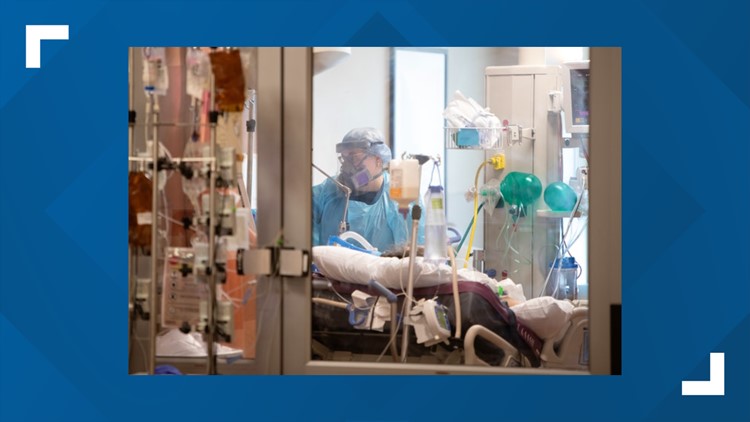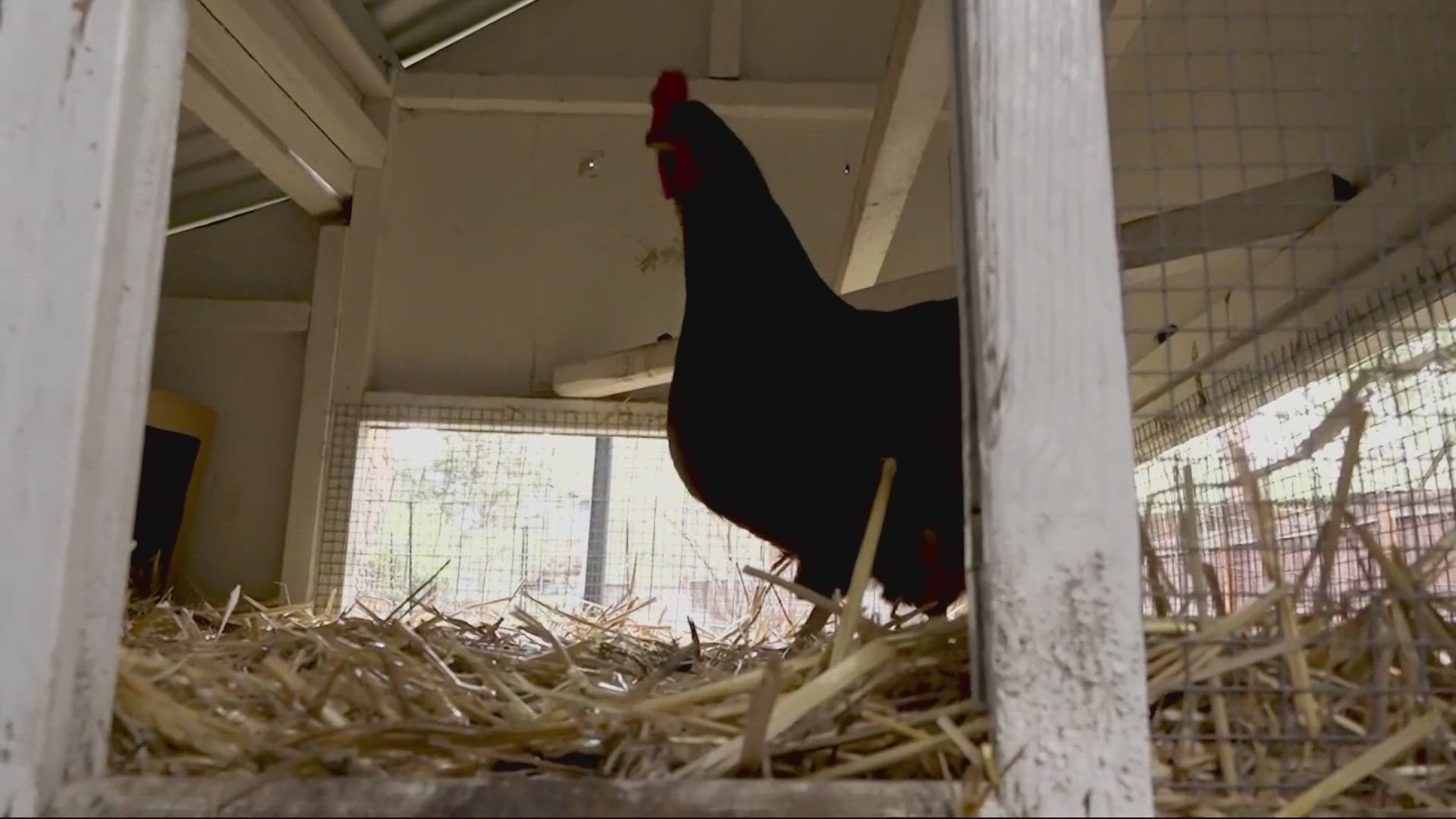In the life-or-death world of Salem Hospital’s intensive care unit, few people coming and going have time to stop to read a poster on the wall next to the fourth-floor elevator bank.
The hand-drawn art shows a masked nurse wearing blue scrubs, straining and sweating as he holds up a globe with both hands. The earth has spikes protruding from its edges, calling to mind a coronavirus particle.
The poster was put up several months ago to honor then-ICU nurse manager Seunghyo Hong for his work setting up intensive care beds across the hospital to make room for the current surge of Covid patients that have helped fill the normally 30-bed unit beyond capacity.
For Lisa, a nurse working Friday afternoon, the lone nurse holding up the world is an apt depiction of how she and her more than 100 colleagues have felt in recent weeks.
“We've been dealing with record numbers of patients, record numbers of unvaccinated patients. It’s frustrating and sad to see. We’re dealing with the second wave, when we thought, I guess we hoped, it wouldn’t come. It's come, it's come harder and worse, way worse than before,” Lisa said. She asked her last name not be published because discussions over Covid, hospital care and vaccination have become so political that she doesn’t want to be seen as taking sides for doing her job.
Lisa speaks matter-of-factly, her voice betraying little emotion as she describes managing fifteen different medications for the unconscious, sedated patients under her care.
She’s a member of the hospital’s rapid response team, so she can be paged to respond to urgent medical situations anywhere in the hospital if a patient’s needs go beyond what the unit’s regular staff are trained to manage.
Patients who would normally be in the ICU are instead receiving intensive care in other wings of the hospital, so Lisa has to walk further during a typical shift to respond to calls. Years ago, she briefly wore a pedometer to work and clocked 11 miles walking during a regular shift. She knows that number has been far higher during the latest Covid surge, but said she has no desire to track it.
“I don't want to know any more. It makes it worse,” she said.
Friday’s hospital census included 88 Covid patients in the hospital, 78 of them unvaccinated against the virus. Twenty of the sickest were in the ICU, fifteen of those on ventilators to breathe for them because the virus has ravaged their lungs.
The clear doors to each patient’s room are closed, with a tower of IV bags outside so nurses can adjust medication and monitor patients without having to enter the room. With most patients sedated, the unit is eerily quiet: the steady beep of a heart monitor is the only constant sound.
But the work for staff is intense and exhausting, said Dr. Marty Johnson, a pulmonologist and the ICU medical director.
Before the pandemic, the ICU was typically 85 to 90% full, Johnson said. Now, it’s beyond capacity, and the patients in their care are sicker and there for longer. By the time a Covid patient reaches his unit, Johnson said they’re typically in “extreme distress,” on the verge of going on life support.
“Taking care of them is very stressful from an emotional perspective ... we know if they're going on a ventilator that the chances of them coming off a ventilator are probably a coin flip,” he said. “There's always a scramble as you're getting to put them on life support. It may be their last opportunity to speak with their family, to interact, to meet, in some cases say their last words. So that makes it very tough and poignant and kind of emotionally draining.”
Johnson said health care workers often feel powerless to help because there’s little they can do besides keep patients alive while their body tries to fight the disease. They turn patients on their stomachs to help them breathe more easily, a physically demanding process requiring multiple workers to ensure breathing tubes and other life supports stay in place while the patient is moved.
“They get better or they don’t get better. There’s very few therapeutic interventions we can do that can miraculously change the course of it and that’s a big source of frustration and fatigue as well, that we don’t have an ability to make people better,” he said.
Under normal conditions, ICU nurses work three twelve-hour shifts weekly. Most, including Lisa, have been working extra days, sometimes six or seven in a row.
She said this surge is better than previous peaks in one regard: she’s now vaccinated against Covid and said she’s no longer worried an infection contracted on the job could be fatal.
“Even though I feel like I'm gonna die from working too hard, it really won't happen, right?” she said, with a small laugh.
Lisa once played roller derby in Salem and now belly dances as an outlet after work. The hospital has offered yoga and meditation classes to help employees manage stress, but for those like Lisa who prefer a more aggressive outlet, the hospital’s wellness department contracted a mobile "rage room" to set up in the courtyard a few weeks ago. There, Lisa joined other nurses donning safety goggles and smashing plates.
“We took plates and we shattered them. And I kept going back, I kept going back and they told me I had enough turns,” she said.
The memory made Lisa laugh, along with several nurse colleagues who listened in as she talked to a small group of reporters Friday. The feeling of camaraderie and teamwork in the unit has kept many of them going through the most difficult work most have ever done.
The unit last lost a Covid patient Thursday night, Johnson said on Friday afternoon.
Death is part of the job, but Johnson, who’s been working at Salem Hospital for 26 years, said the Covid deaths wear more on the staff. It’s not unusual to spend weeks caring for someone who ultimately dies from the virus. That means weeks growing used to their needs and medications and weeks’ worth of phone calls updating anxious relatives on any changes in condition.
“When many of them ultimately die, there’s a sense of failure, a sense of loss that’s more than you’d typically see in the ICU,” he said.
As he listens to patients saying goodbyes to family, he said last wishes and messages of love often mix with regret that people chose not to get vaccinated.
“There can be a lot of remorse as part of that conversation, which adds another layer of tragedy for the whole thing,” he said.
This story was contributed by the Salem Reporter via The Associated Press



